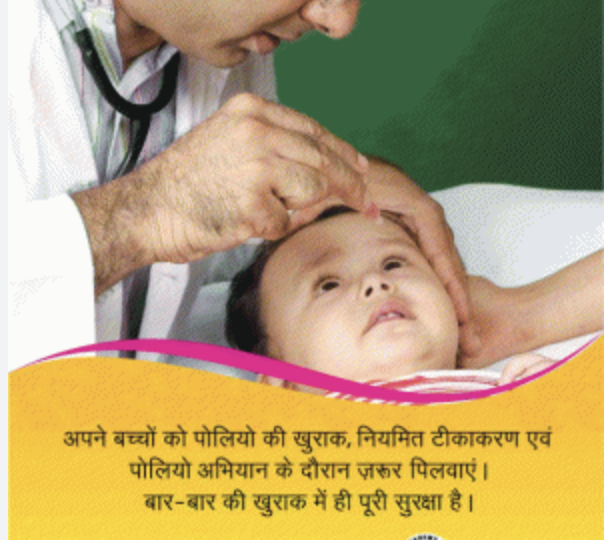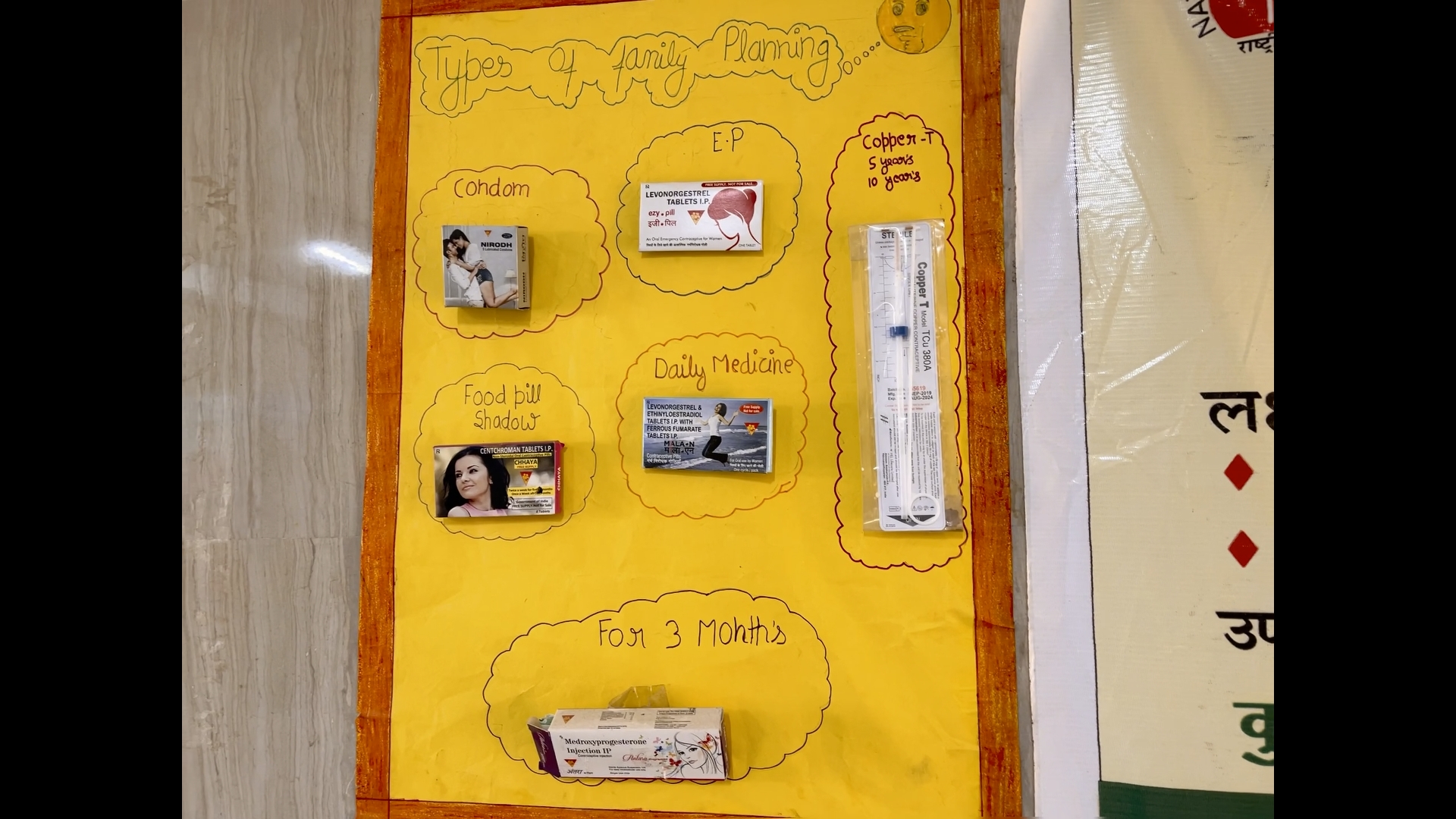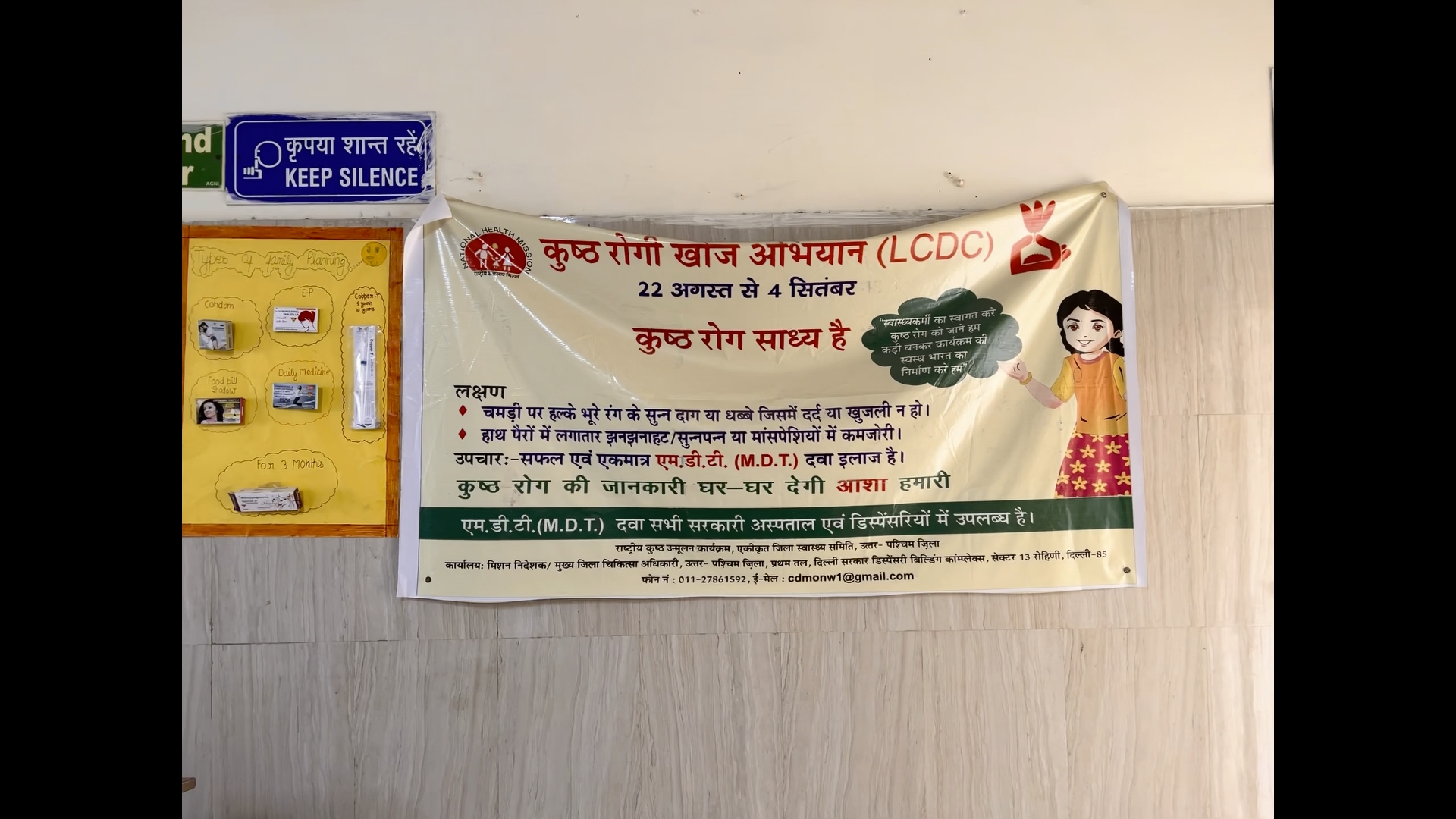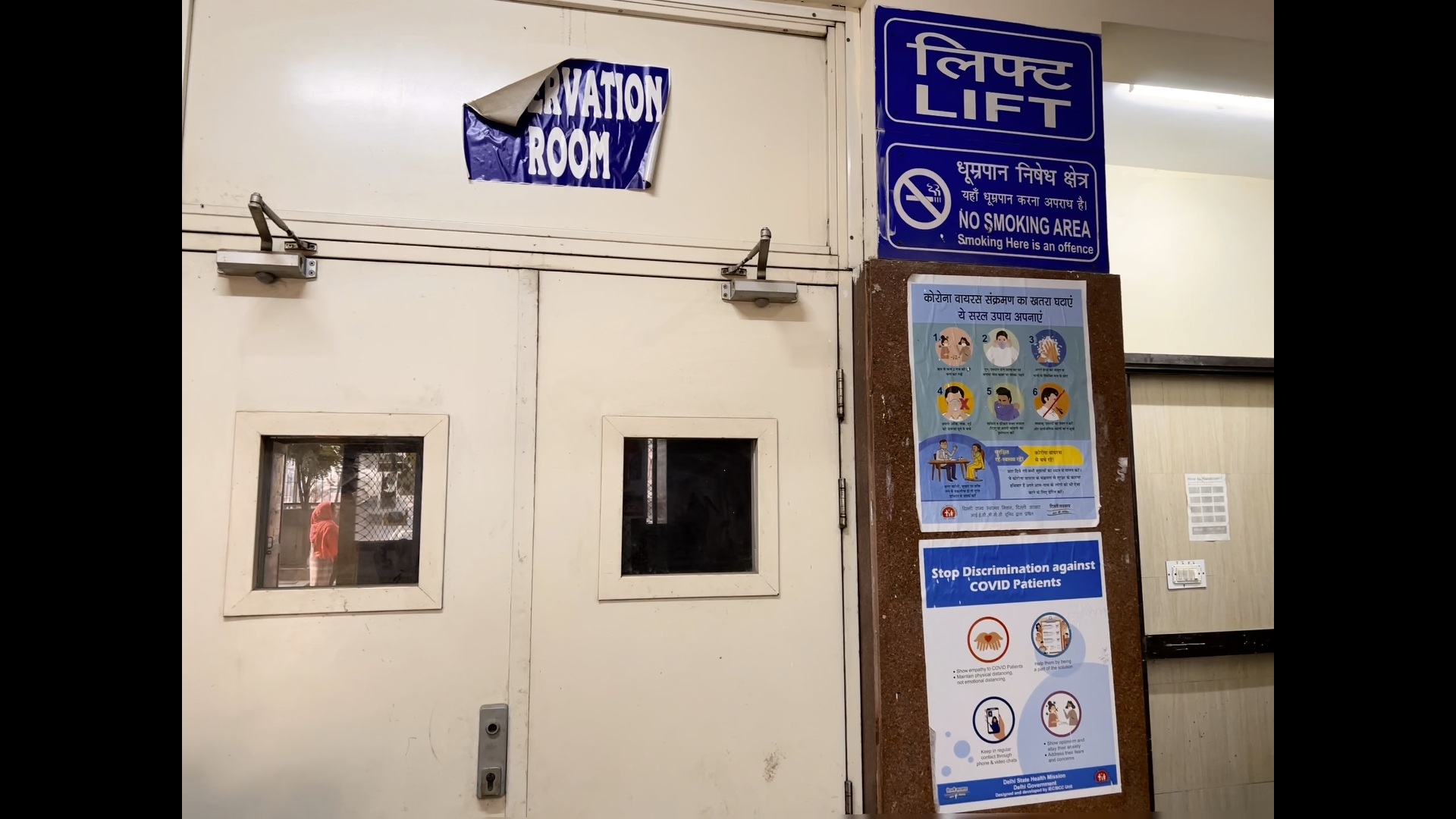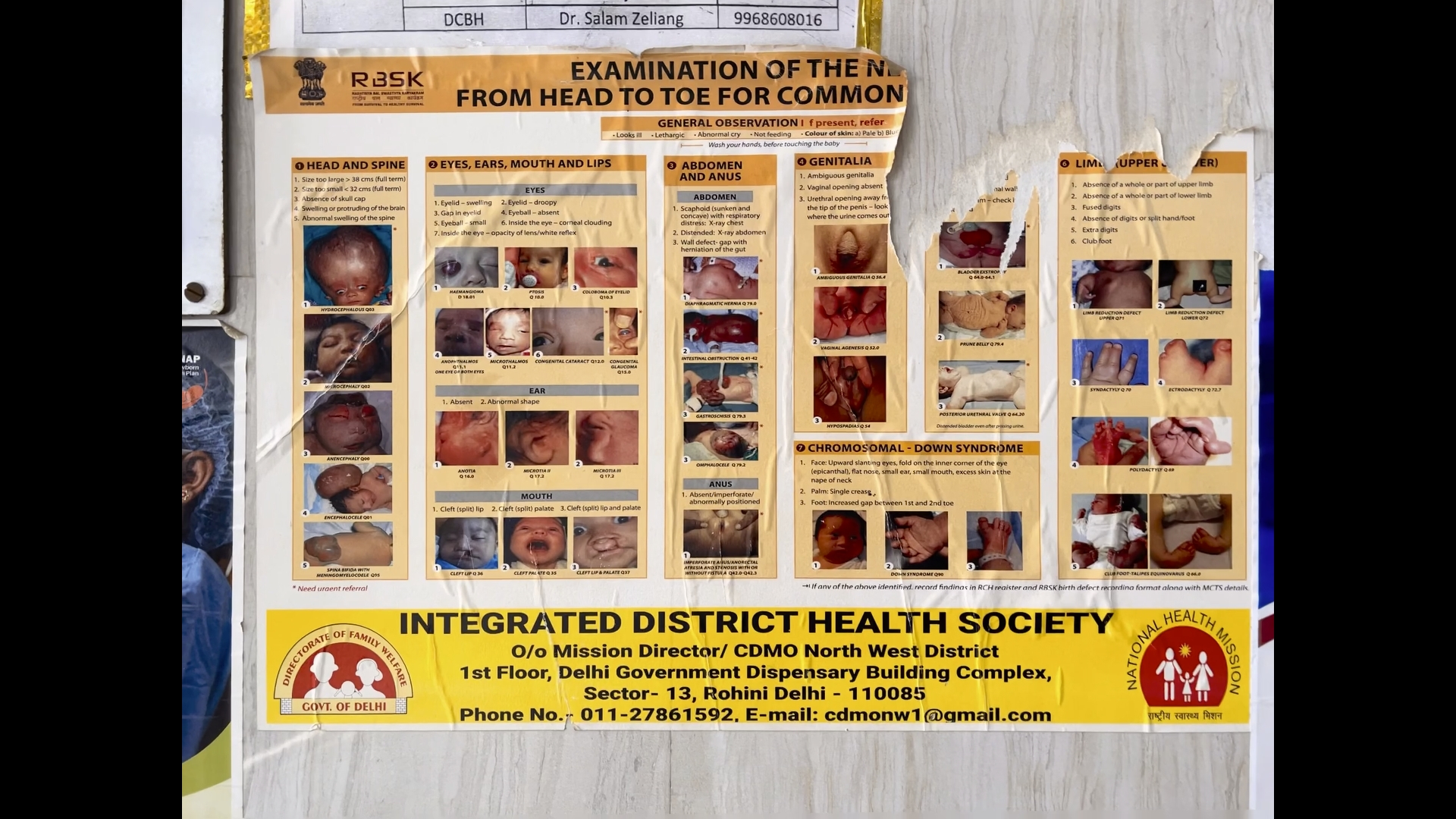एक डॉक्टर के पास थोड़ी देर
Meeting with a Doctor
दीवारों पर बीमारियों की जानकारियों के इश्तहार चिपके हुए हैं। कमरे में एक काँच की मेज़ है और उसके सामने डॉक्टर साहब की कुर्सी लगी हुई है। कुर्सी पर डॉक्टर साहब बैठे हुए हैं। सामने टँगी दीवार घड़ी में सुबह के साढ़े दस बज रहे हैं। डॉक्टर साहब की उम्र 30 से 35 साल की होगी। वह आज काली पैंट, काली शर्ट और काले जूतों के अंदर सफ़ेद मोज़े पहने हुए हैं। उनके गालों पर उगी दाढ़ी अपना रंग बदलने लगी है। काले बालों के बीच में एक आध सफ़ेद बाल दिख रहे हैं।
The walls of the dispensary are filled with posters informing visitors about different diseases. There is a glass table in the room placed in front of the doctor’s chair. The doctor sahib sits in his chair. The wall clock shows the time as ten thirty in the morning. The doctor must be between thirty and thirty-five. Today he is dressed in black trousers, a black shirt, and black shoes from which peeked a pair of white socks. A few strands of grey have begun peeking out of his primary black beard.
‘सर! क्या मैं अंदर आ सकती हूँ?’ यह पूछते हुए एक छोटे क़द की गठीले शरीर वाली महिला प्रवेश करती है। उसके हाथ में एक पुरानी पर्ची है जो कई महीने पहले की है। उस पर शुगर और बीपी की दवा लिखी हुई है। इन कई महीनों में कई डॉक्टर इस पर्ची पर अपने साइन के साथ दवाओं के नाम गोद चुके हैं। पर्ची जर्जर हो चली है। महिला सामने की ख़ाली पड़ी कुर्सी पर बैठते हुए नई पर्ची बनाने का आग्रह करती है। उसके आग्रह को सुनकर डॉक्टर साहब उठते हैं और अपने बगल में टँगे बैग से पेन और डिस्पेंसरी की पर्ची निकालते हैं। इस पर्ची पर पुरानी पर्ची की दवाओं के नाम उतारते हैं और पर्ची पर नई दवाइयाँ लिखकर बाहर से दवा लेने के लिए भेज देते हैं। बाहर का मतलब डिस्पेंसरी के दूसरे कमरे वाली खिड़की। वह पर्ची लिए बाहर निकल गई। बहुत दिनों के बाद आज उसकी नई पर्ची बनी थी।
“Sir! May I come in?” A short and sturdy looking woman enters the room. She is holding a prescription which has been stamped many months ago. It has medicines written for diabetes and high blood pressure. In the last few months, different doctors have written names of different medicines and signed this document. The prescription is now in tatters. The woman requests a new prescription as she seats herself on an empty chair. Hearing her, the doctor takes out a pen and a prescription pad from his bag. He copies the names of medicines from the old prescription, adds a few new ones and sends her to get them from the medicine window. She takes the prescription and leaves the room. She has a brand new prescription after a long time.
डॉक्टर साहब कमरे में ही बैठे थे, मैंने अंदर घुसते ही कहा, ‘सर, मैं आपसे बात करना चाहता हूँ।’
The doctor sahib was still in his chair when I entered the room. “Sir, may I please speak with you?”
स्थानीय डिस्पेंसरी बनाम मोहल्ला क्लिनिक
Local Dispensary vs. the Mohalla Clinic
‘बात, कैसी बात? आओ अंदर आओ? बताओ क्या बात है?‘ डॉक्टर ने कहा ।
“What would you like to speak about? Come in. Tell me what you would like to know,” the doctor asked.
मैंने तुंरत पूछा, ‘डिस्पेंसरी में किस तरह की बीमारी के लोग ज़्यादा आते हैं?‘
I asked, “What illnesses do most people come for treatment?”
डॉक्टर ने जवाब दिया, ‘बस नार्मल बीमारी वाले, खाँसी, जुक़ाम, बुख़ार, पेट-दर्द, स्किन एलर्जी आदि। बड़ी बीमारी वाले तो बड़े हॉस्पिटल जाते हैं। वहाँ उनका इलाज़ हो जाता है। जब उन्हें थोड़ा आराम लगता है तो बाक़ी की दवा यहीं से लेने आते हैं। सावदा से बड़ा हॉस्पिटल काफ़ी दूर है। जब से कोरोना आया है तब से उसकी जाँच से लेकर वैक्सीन का बूस्टर डोज़ भी अब यहीं लगाए जा रहे हैं। आजकल शुगर की बीमारी आम हो गई है। इसकी दवाई भी लोग यहीं से ले जाते हैं। बड़े बुज़ुर्गों को साँस लेने में दिक़्क़त होती है तो हम उन्हें ऑक्सीजन पंप देते हैं। टीबी डॉट्स का सेंटर कंझावला डिस्पेंसरी में है। अपनी डिस्पेंसरी में जाँच की कोई सुविधा नहीं है। इस वजह से बड़ी बीमारी वाले मरीज़ यहाँ आते ही नहीं।
The doctor said, “The usual ailments: cough, cold, stomach ache, skin allergies etc. When there is serious illness, then people go to big hospitals. Once they start recovering, then they are referred back to the dispensary. All the big hospitals are very far from the local dispensary in Savda. Since the pandemic, treatment for Covid as well as all vaccinations are now administered from the dispensary. Diabetes has become common now and its medication is also available here. When the elderly suffer from asthma, then they get nebulisation and oxygen from this local dispensary. The tuberculosis DOTS centre is at Kanjhawla dispensary, and people have to go there for its treatment. Any serious illness cannot be treated at the dispensary here.”
भारत के पश्चिमी दिल्ली के बाहरी इलाके में स्थित सावदा घेवरा पुनर्वास कॉलोनी में स्थानीय डिस्पेंसरी में कुष्ठ रोग के बारे में जागरूकता फैलाने के लिए एक पोस्टर।
डॉक्टर साहब आगे बोले, ‘कोई एक्सीडेंट का केस है, किसी को दर्द हो रहा हो, कोई बेहोशी की हालत में है, किसी को घबराहट है तो हम लोग ख़ुद उसकी हालत की गंभीरता देखकर बड़े हॉस्पिटल भेज देते हैं। वैसे लोगों का इलाज़ ऐसे भी हमारे बस में नहीं होता। हाँ, कई बार बड़े अस्पताल वाले दवा लेने के लिए डिस्पेंसरी का पता लिख देते हैं। कभी-कभी मरीज़ डिस्पेंसरी से रेफ़र होने के बाद बड़ा अस्पताल पहुँच जाता है। कई मरीज़ों का डिस्पेंसरी ही अंतिम सहारा होती है। हम तो सरकारी डॉक्टर हैं, हमारा विभाग हमें जहाँ भेजता है, वहीं जाकर मरीज़ की सेवा करते हैं। यहाँ की मैडम छुट्टी पर हैं, इस वजह से हमें एक हफ़्ते के लिए सावदा डिस्पेंसरी में भेज रखा है। तब से यहाँ के मरीज़ों की देखभाल कर रहे हैं। एक हफ़्ते बाद मुझे कहीं और जाना होगा। हमें तो कहीं भी अपनी नौकरी बजानी है।’
The doctor said, “If there has been an accident, severe pain, fainting or uneasiness, then depending upon the seriousness of the situation, we refer the patient to a big hospital. We are not equipped to treat such patients. At times, big hospitals refer patients to their local dispensaries, and at other times, the dispensary refers cases to big hospitals. For some patients though, the dispensary is their first and last support. We have been appointed by the government and we go wherever we are appointed. The lady who is the usual doctor here is on leave, so I have been appointed here for a week. Now I am caring for patients here, but after a week I will have to go somewhere else. This is a part of my job.”
यह सुन सामने बैठी डिस्पेंसरी की मैडम हल्की तल्खी के साथ बोली, ‘इस कॉलोनी में रहने वाले लोग झूठ बोलकर भी दवाएँ ले जाते हैं। जिसमें गर्म पट्टी, जेल वाली ट्यूब, कैल्शियम की गोली, छोटे बच्चों के लिए पैरासिटामोल की सीरप और बुज़ुर्गों का कफ़ सीरप शामिल है। उन्हें लगता है सरकार से हमें दवा मिल रही है, कौन-सा हमारा पैसा लगता है। ये लोग जब तब मुँह उठाए चले आते हैं। अगर कुछ बोलो तो ये लोग चौड़े हो जाते हैं, यह कहते हुए कि अपने घर से दवा लाई हो क्या? हमें तो सरकार दे रही है, आपको देने में क्या तकलीफ़ है।
When the female staff member sitting opposite heard us, she said harshly, “People from this locality often lie to us to get basic medicines like soothing pads, calcium tablets, paracetamol and syrups for children and cough mixtures for the elderly. They think since the government is providing them for free, therefore they should take them. They walk in whenever they want and if I reproach them, then they say, “Have you got these medicines from your own home? If the government gives these medicines for us, then you should hand them to us without creating any trouble.”
हम डिस्पेंसरी वालों को सब तरफ़ देखना पड़ता है। सरकारी नियम इतना आसान भी नहीं होता। मेरी तरफ़ देखते हुए वह बोली, ‘ज़मीनी हक़ीक़त क्या है वह हमें और आपको भी मालूम है। बहुत-सी ऐसी महिलाएँ आती हैं, वे अपने साथ दूसरों की भी दवाइयाँ ले जाती हैं जो घर से यहाँ आई भी नहीं होती। कुछ बोलो तो पर्दे के अंदर से कहती हैं कि मेरी ही उम्र की है और उसको भी यही तकलीफ़ है। उसका छोटा बच्चा है इस वजह से नहीं आई है। आख़िर दवा देने में तुम्हारा क्या जाता है? पिछली बार तो उसे, तुमने मेरे लिए दवा दे दिया था और मुझे मना कर रही हो। अंत में हम डिस्पेंसरी वाले को दवा देनी ही पड़ती है। खाने के लिए गोली दो तो सीरप माँगती है। सीरप दो तो कहती हैं, पिछली बार तो आपने गोली दी थी। उनको समझाना बहुत मुश्किल होता है, सभी पर्दे या घूँघट की आड़ से बोलती हैं। बात तो ऐसे करेंगी जैसे वह आपसे ज़्यादा समझदार है।’
The staff running the dispensary have to be very careful. There are many government regulations to be obeyed. The lady looked towards me and said, “We all know what happens in reality. Many women who come for their own treatment also take medicines for other women who are friends or family members. If we ask them, then they say from behind the purdah, ‘They are just like us and are as old as us as well. They also have the same problems. She has a small child so she couldn’t come herself. How does it matter to you? You must give me medicines for her as well. Last time you gave her medicines for me, but this time you are denying me.’ We sometimes have no choice but to give in. If we give them tablets then they ask for syrups, but when we give them syrups then they ask for pills. It is very difficult to explain things to them as most women speak from behind the purdah or a ghunghat.”
डॉक्टर ने मैडम की बात को रोकते हुए कहा, ‘अरे! मैडम कहाँ की बातों में लग गईं, सिर्फ़ अपना काम ठीक से किया करो।’ मैडम वहाँ से उठी और दवा वाले कमरे की ओर चली गई। इसी बीच मेज़ पर रखा फ़ोन हिला, फ़ोन साइलेंट पर था। डॉक्टर ने फ़ोन उठाया, ‘हैलो, एक मिनट रुको, फ़ोन करता हूँ।’
The doctor told the lady, “Arrey madam, you are making mountain out of a molehill! Why don’t you go and do your job!’ The lady got up and went to the room where medicines were handed out. That is when the phone lying on the table vibrated. “Hello. Please wait for a minute and I will call you back.”
सामने दरवाज़े पर पतली काया वाली महिला अपने हाथ में दवाओं की पोटली लिए डॉक्टर साहब को देखे जा रही थी। डॉक्टर साहब ने उसे अंदर आने के लिए कहा। महिला ने दवा को पन्नी से बाहर निकालकर उनके सामने मेज़ पर रख दिया। ‘साहब इन दवाओं को खाने का तरीक़ा बताओ।’ डॉक्टर ने मेज़ पर बिखरी हुई सारी दवाओं को अलग-अलग किया। फिर उस महिला को समझाना शुरू किया ‘ये तीन गोली ख़ाली पेट, यह गोली खाना खाने के बाद, बाक़ी को आधे-आधे घंटे पर खाना है। और यह काली पन्नी वाली को रात में सोने से पहले खाना है। और यह दो रंगों वाली गोली जब ज़्यादा दर्द हो तो खाना। समझ में आया कि नहीं?’
A frail woman stood staring at the doctor from the door. The doctor asked her to come in. The woman took out some medicines from a plastic bag and put them on the table. “Sahib, please tell me the proper way to take these medicines.” The doctor first organised all the medicines scattered on the table. Then he explained to the woman, “These three should be taken on an empty stomach, this one after your meal, and this one should be had every half hour. This one in the black packet should be taken at night before sleeping. These double coloured medicines should be had if you are in a lot of pain. Have you understood now?”
वह थोड़ी गहरी साँस लेते हुए बोली, ‘ठीक है।’ और सभी दवाओं को फिर से पहले की तरह पन्नी में भर लिया। नमस्ते बोलते हुए वह जिधर से आई थी उधर से ही वापस चली गई। उसके जाते ही डॉक्टर साहब ने कहा, ‘इन्हें दवाओं के नाम से नहीं रंगों के हिसाब से समझाना पड़ता है। यह कैसे खाएँगी अब ये जाने। यह बात इनके लिए ही नहीं है। नब्बे प्रतिशत लोग रंग और साइज देखकर ही खाते हैं। नाम से तो बिलकुल नहीं।’
She took a deep breath and said, “Ok. She thanked the doctor and left. The doctor then told us, “We have to explain the dosage to them not by the names of the medicines but by their colour. I don’t know if she will remember everything or not. This is not just limited to her. Ninety percent people remember their dosage from the size and colour of the tablets and not by their names.”
स्थानीय डिस्पेंसरी मे टीकाकरण।
Inoculations at the Local Dispensary
डॉक्टर साहब कुर्सी पर बैठे-बैठे ही हमारी तरफ़ मुखातिब होते हुए कहने लगे कि हमारे पास मौसमी बीमारियों की दवाईयाँ रहती हैं। पैरासिटामोल, आईब्रुफेन, क्रोसिन एडवांस, बेनाड्रिल कफ़ सिरप, कोफ़ोल कफ़ सिरप, बी-टेक्स मलहम, जेल ट्यूब, गर्म पट्टी, यही सब दवाई है, जो फ़र्स्ट-ऐड के लिए इस्तेमाल में आती हैं। अभी बात चल ही रही थी कि फिर से फ़ोन हिला और मैं समझ गया कि डॉक्टर साहब बात करेंगे तो उन्हें वक़्त लगेगा। मैं उन्हें नमस्कार कर कमरे से निकल गया।
The doctor explained to us that they have medicines for usual seasonal ailments. Paracetamol, Ibuprofen, Crocin Advance, Bendryl cough syrup, Kofol cough syrup, B-Tex balm, gel tubes, warm compresses, medicines which are useful for first aid. We were still chatting when the doctor’r phone vibrated again and I realised that it was time to leave. I joined my hands in a Namaskar, thanked him and left.
